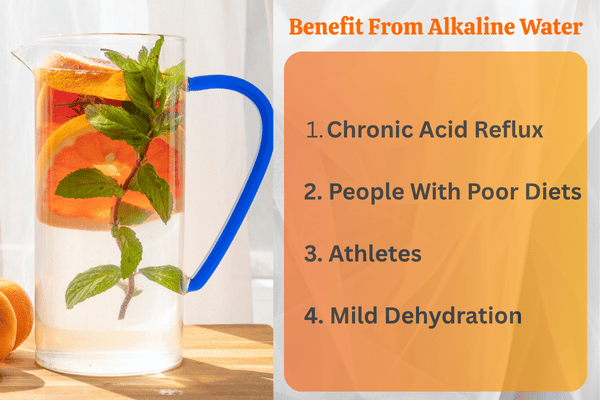Alkaline water is everywhere—from supermarket shelves to celebrity wellness routines. It’s often marketed as a healthier alternative to regular water, claiming to neutralize acid in the body, boost energy, slow aging, and prevent chronic diseases. But are these claims backed by science? Or is it just clever branding?
This blog breaks down what alkaline water is, what it claims to do, what research really says, and whether it belongs in your daily routine. You’ll also hear insights from a trusted nutrition expert to help you make an informed choice.
What Is Alkaline Water?

This water has a higher pH level than regular drinking water. pH measures how acidic or alkaline a substance is, on a scale from 0 to 14.
- Regular water typically has a neutral pH of around 7.
- It usually has a pH of 8 or 9.
Some brands also include minerals like calcium, potassium, and magnesium to increase alkalinity. This is either done naturally through contact with rocks or artificially using a process called electrolysis.
Common Claims About Alkaline Water
This water enthusiasts often claim the following:
- It helps neutralize acid in the body
- Improves metabolism
- Increases energy levels
- Slows aging by reducing oxidative stress
- Aids in weight loss
- Supports bone health
- Prevents diseases like cancer
These claims sound impressive, but most of them lack consistent scientific backing. That doesn’t mean this water is harmful—it means you should evaluate the facts before making it a habit.
What Does Science Say?

1. Acid-Base Balance
The human body maintains a tightly regulated pH, especially in the blood (around 7.35–7.45). Your lungs and kidneys manage this balance automatically. Drinking alkaline water might briefly change the pH of your urine or saliva, but it won’t alter your blood pH.
So, the idea that this water significantly changes your body’s internal pH isn’t supported.
2. Hydration
Some studies suggest alkaline water may improve hydration after intense exercise. This is mainly due to added minerals, not just its pH.
If you’re an athlete or live in a hot climate, it might help—but regular water does the job too if you’re consistently drinking enough.
3. Bone Health
A few studies have explored the relationship between alkaline diets and bone resorption (the breakdown of bone tissue). Some showed reduced calcium loss in urine, which seems positive. But no study has proven that alkaline water directly strengthens bones or prevents osteoporosis.
4. Acid Reflux Relief
There’s some evidence that this water with a pH of 8.8 can deactivate pepsin, the enzyme responsible for acid reflux. People with chronic heartburn may find this helpful—but this effect is specific and not generalizable to everyone.
5. Detox Claims
The term “detox” is often misused. Your body has built-in systems (liver, kidneys, intestines) that handle detoxification. Drinking this water doesn’t enhance or replace these systems. What helps most is staying hydrated with any clean, safe water.
6. Anti-Aging & Cancer Prevention
These claims are the most misleading. There’s no clinical evidence that this water reduces wrinkles, slows aging, or prevents cancer. Antioxidants help fight oxidative stress—not pH level in water.
Who Might Benefit From Alkaline Water?
While it may not be necessary for everyone, there are specific situations where alkaline water might help:

- Chronic Acid Reflux: If regular antacids aren’t working, this water may offer mild relief.
- People With Poor Diets: If your meals are overly acidic (processed foods, sugar), alkaline water could help balance things slightly—though diet changes are more effective.
- Athletes: For those with intense physical activity, rehydrating with mineral-rich water might reduce fatigue.
- Mild Dehydration: Some users report improved taste and ease of consumption, which might help increase fluid intake.
Deepak KD, a practicing nutritionist and consultant at D’FAB U in Thane, works with individuals facing various health challenges—from diabetes and hypertension to post-surgery recovery.
She emphasizes food-first strategies, personalized meal planning, and evidence-backed changes over trendy health fads.
You can consult her at:
D’FAB U Thane
Kabra Galaxy, Brahmand, Thane, India
To book an appointment, call or visit the clinic directly.
FAQs About Alkaline Water
1. Can I drink alkaline water every day?
Yes, it’s generally safe for healthy people. But if you have kidney problems or take medications that affect electrolytes, consult your doctor first.
2. Is bottled alkaline water better than home-based ionizers?
Both can be effective, but check for added minerals and certification. Some ionizers may not maintain stable pH levels.
3. Does alkaline water help with weight loss?
There’s no strong evidence. Staying hydrated may help reduce appetite, but alkaline water itself doesn’t burn fat.
4. Can kids or pregnant women drink alkaline water?
It’s usually safe in moderation. But there’s no extra benefit over regular clean water. Speak with a pediatrician or OB-GYN before making it a daily habit.
5. Is alkaline water better than lemon water for acidity?
Both may offer mild relief. Lemon water becomes alkaline after digestion and contains vitamin C. This water is neutral in taste but lacks nutrients.
Conclusion
Alkaline water isn’t a miracle drink, but it’s not harmful either. For most people, regular filtered water is enough to stay hydrated and healthy. Some specific groups may experience mild benefits, but there’s no need to spend extra unless you notice a difference.
If you’re dealing with a specific health issue like acid reflux or intense workouts, consulting a qualified nutritionist like Deepak KD can help you make the right choice based on your body’s needs—not health trends.
Before making changes to your hydration routine, ask yourself: are you drinking enough water in the first place?
For safe, personalized guidance, always consult a qualified expert who understands your full health picture.

